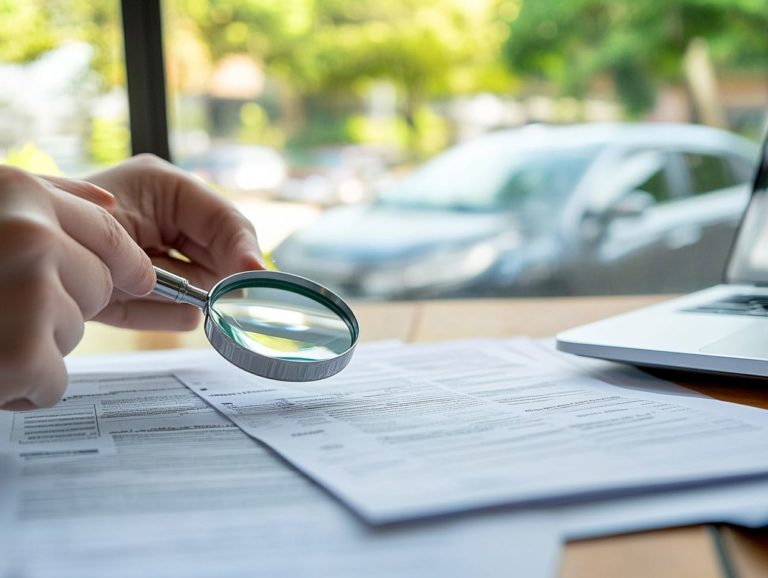5 Signs of a Good Used Car Deal
Finding the right used car can feel like navigating a maze. However, understanding what to look for can transform the experience into something smoother and more rewarding.
This guide delves into five essential signs that indicate a solid used car deal. It covers everything from fair pricing to the vehicle’s history and maintenance records.
Additionally, it offers valuable tips on negotiating wisely, identifying red flags, and protecting yourself against potential pitfalls.
Whether you re a first-time buyer or a seasoned expert, this information will empower you with the knowledge to drive away with confidence.
Contents
- Key Takeaways:
- 1. The Price is Fair and Within Your Budget
- 2. The Car Has a Clean Title and No Major Accidents
- 3. The Vehicle Has Been Well-Maintained
- 4. The Seller Is Reputable and Transparent
- 5. The Car Passes a Thorough Inspection
- How to Negotiate a Good Deal on a Used Car?
- Frequently Asked Questions
- What are the 5 signs of a good used car deal?
- How can I tell if a used car deal is fair?
- Why is a clean vehicle history report important for a used car deal?
- Should I have a mechanic inspect a used car before making a deal?
- What should I look for during a test drive to determine if it is a good used car deal?
- Is it important to have a warranty for a used car deal?
Key Takeaways:

- Make sure the price of the used car is fair and fits within your budget.
- Ensure the car has a clean title and no major accidents in its history.
- Look for signs of good maintenance, such as regular servicing and a clean interior.
1. The Price is Fair and Within Your Budget
When buying a used car, make sure the price is fair and fits your budget. This choice affects both your financial stability and your satisfaction with the vehicle.
Researching the car’s value through reputable sources like Consumer Reports can provide valuable insights into pricing trends. This research could unveil a deal that perfectly aligns with your financial goals.
Understanding your financing options also plays a vital role in managing your budget. This knowledge could unlock great payment options or loan rates tailored to your situation.
Investing in a used car with a reliable engine can lead to significant long-term savings by minimizing unexpected repairs and service costs. This way, your vehicle becomes a dependable asset rather than a financial burden.
2. The Car Has a Clean Title and No Major Accidents
A clean title is crucial when you’re in the market for a used car. It signifies that the vehicle has no major accidents or issues that could compromise its overall condition and safety.
This distinction matters immensely if you’re seeking peace of mind and assurance that your investment is sound. A salvage title indicates that the vehicle has been deemed a total loss due to severe damage, whether from an accident, flood, or other significant incidents.
To make a well-informed decision, perform a vehicle identification number check. This process enables you to trace a vehicle’s history and uncover any hidden problems. Tapping into the National Insurance Crime Bureau (NICB) database can help determine if the car has been reported stolen or has a troubling history of hard resets.
Doing this research helps you avoid big problems later, ensuring that your purchase is safer and more reliable.
3. The Vehicle Has Been Well-Maintained
A well-maintained vehicle speaks volumes about the care it has received. It significantly reduces the chances of hidden issues while ensuring optimal performance and longevity.
To fully grasp a car’s history, it s wise for potential buyers to obtain and thoroughly review its maintenance records. These documents can shed light on previous services and repairs. Look for regular oil changes, tire rotations, and brake inspections, as they reflect an owner’s dedication to the vehicle’s upkeep.
Car inspections are crucial for uncovering any signs of neglect, such as rust, fluid leaks, or worn-out components. By ensuring that a vehicle’s actual condition aligns with what the seller claims, you enable yourself to make informed decisions.
This approach helps prevent unexpected repairs down the road and ultimately enhances your overall driving experience.
4. The Seller Is Reputable and Transparent

When purchasing a used car, choosing a reputable and transparent seller is essential. Choosing a trustworthy seller builds excitement and reduces the risk of headaches later!
This decision fosters trust and significantly diminishes the risk of encountering insurance fraud or hidden issues.
In Prince Albert, the key to finding such a dealer lies in seeking out those with stellar reviews and a track record of satisfied customers. Transparency during the buying process is crucial; it paves the way for open discussions about the vehicle’s history and any potential concerns, ensuring that everyone is aligned.
A long-term relationship with a trusted seller benefits future purchases. It offers you ongoing support and reliable advice, making your subsequent car-buying experiences not just smoother but also far more enjoyable.
5. The Car Passes a Thorough Inspection
A thorough car inspection is essential for uncovering any problems with how the car runs and ensuring that your vehicle aligns with modern technology features, granting you peace of mind with your purchase.
This process generally involves a meticulous examination of both the engine and the car’s suspension parts, along with critical electronic components like braking systems and safety airbags. By diving into these areas, technicians can identify existing problems and assess how well the car has been maintained over its lifespan.
The inspection results provide invaluable insights. You can make informed decisions about necessary repairs or preventive measures. Understanding the comprehensive state of your vehicle can lead to safer driving experiences and save you money in the long run.
How to Negotiate a Good Deal on a Used Car?
Negotiating a favorable deal on a used car requires a strategic mindset. Understanding the vehicle’s value, establishing your budget, and communicating effectively with the dealer are paramount.
With the right research tools at your fingertips, such as online valuation platforms and car history reports, you can gather essential insights that arm you for negotiations. It s wise to compare prices across various listings and consider the vehicle’s condition when determining fair pricing.
Leveraging these resources not only bolsters your confidence during discussions but also strengthens your negotiating position. Exploring available financing options can provide you with additional leverage when making offers, allowing for flexibility within your budget.
Being well-prepared for counteroffers is equally important. Anticipating the dealer s responses enables you to react thoughtfully rather than impulsively, setting the stage for a successful negotiation.
What Are the Red Flags to Look Out for in a Used Car Deal?
When you’re navigating the used car market, keeping an eye out for red flags can save you from potential pitfalls, like hidden problems and signs of neglect. It’s also helpful to learn how to spot a good deal on a new car to ensure you’re making informed decisions.
It s crucial to pay close attention to any unusual modifications, as they can hint at a lack of professionalism or care in maintenance. Be on the lookout for signs of body filler like Bondo, which might suggest undisclosed accidents.
During inspections, examine the paint for inconsistencies and the body for uneven gaps, as these could be covering up previous repairs. Verify maintenance records for a consistent service history. Irregularities can indicate neglect or looming problems.
By taking the time to perform thorough test drives and detailed inspections, you’ll be better equipped to identify these red flags, ultimately guiding your decision-making process. Additionally, consider these 5 tips for buying a used car from a dealer to stay alert for potential issues while shopping for your next used car!
What Are the Benefits of Buying a Used Car?

Buying a used car has many advantages. You can save money on the purchase price, enjoy lower insurance costs, and face less depreciation than with new cars.
A used car tends to lose value at a slower pace. This makes it a smarter investment over time.
This aspect not only reduces long-term costs but also improves your resale prospects when it s time for an upgrade.
By choosing a pre-owned vehicle, you gain access to a broader selection. This allows you to explore various makes, models, and features that may no longer be offered in new cars.
This extensive range helps you find a vehicle that aligns with your unique needs and preferences while maintaining solid resale value down the road.
What Are the Most Important Factors to Consider When Buying a Used Car?
Ready to buy a used car? Here s what you need to know! Several key factors deserve your attention to ensure a wise investment.
Start by examining the exterior and interior for signs of wear or damage. These details often reveal how well the previous owner maintained the vehicle.
A thorough maintenance history is essential, so don t hesitate to request service records that confirm regular check-ups and repairs.
Also, pay attention to important safety features like airbags and electronic stability control systems, as these significantly impact the vehicle’s overall safety.
As you explore financing options, consider various lenders and compare interest rates to find the best match for your budget. This ensures your monthly payments comfortably align with your financial circumstances.
How Can You Protect Yourself from Buying a Lemon?
Stay sharp to avoid buying a lemon! Here s how to protect your investment.
Start by performing a VIN (Vehicle Identification Number) check and obtaining a thorough car inspection. Consider a used car warranty for added peace of mind.
Before you commit to any purchase, take several key steps that safeguard your investment. A VIN check reveals any past accidents, title issues, or recalls that could affect the vehicle s reliability.
Getting a comprehensive car inspection from a trusted mechanic can uncover hidden problems that might not be immediately visible. This proactive approach helps you understand the vehicle’s true condition.
Lastly, securing a used car warranty offers reassurance. It ensures you re covered for unforeseen mechanical failures, making your purchasing experience smoother and more secure.
What Are the Most Reliable Sources for Finding a Good Used Car Deal?
Finding a great used car deal involves diving into reliable sources. Check out local dealerships, online platforms, and trusted resources like 5 tips for buying used cars at a dealership for valuable insights and reviews.
By broadening your search, you can uncover options that cater to various budgets and preferences. Websites like Autotrader and CarGurus allow you to compare prices and features from the comfort of your home.
Local dealerships often present exclusive promotions that can lead to remarkable bargains. Leveraging Consumer Reports significantly enhances your decision-making process.
It provides comprehensive reliability ratings and in-depth assessments of different makes and models, allowing you to evaluate both the value and longevity of your potential purchase.
Frequently Asked Questions

What are the 5 signs of a good used car deal?
The 5 signs of a good used car deal include a clean vehicle history report, a thorough inspection by a mechanic, a fair price, a reasonable warranty, and a smooth test drive. For those looking at new cars, knowing how to spot a good new car deal is equally important.
How can I tell if a used car deal is fair?
To determine if a used car deal is fair, compare the price of the vehicle to its market value. Consider the car’s age and mileage, and take into account any additional features or perks included in the deal.
Why is a clean vehicle history report important for a used car deal?
A clean vehicle history report shows that the car hasn t been in major accidents or suffered serious damage. This gives you peace of mind about its condition and future repairs.
Should I have a mechanic inspect a used car before making a deal?
Yes! It s essential to have a mechanic inspect the car before finalizing your purchase. They ll spot hidden problems that could save you money down the road.
What should I look for during a test drive to determine if it is a good used car deal?
During the test drive, focus on how the car handles, brakes, and accelerates. Listen for unusual noises and check that all features work properly.
Is it important to have a warranty for a used car deal?
A reasonable warranty provides added protection and peace of mind. It also shows that the seller stands behind the quality of the vehicle.






